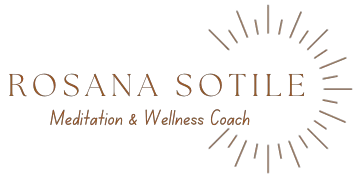Articles of Knowledge

Only the Ego Creates Meaning
By: Rosana Sotile, Chopra Certified Well-Being Coach
“Meaning is NOT the objective truth. It is a form of perspective."
What is Meaning?
Many of us fool ourselves into thinking that our version of events is the objective truth, but in reality, our version of the "truth" is heavily influenced by our own perspective. And even more so by our ego mind.
We see this often in relationships and is a common cause of misunderstandings and unnecessary conflict. For example, imagine a situation in which you send a text message to your partner and they take a very long time to text back, or when they do respond, their response is not what you were wanting it to be. In reality, there are an infinite number of possible truths as to why they took so long or why they responded the way they did. But your ego mind has already created its own perception and assigned its own meaning to the situation, no matter how far from the objective truth it is.
In order to see the objective truth, you'd need to be able to study the situation from every angle, including through the eyes and experiences of each individual involved. And that's no easy task, especially if your ego mind is running the show.
The Ego Loves Comfort
The human mind has three unique parts: memories, intellect and ego. Most people are aware of their minds storing memories and when their intellect is required. But it's the ego that typically goes unnoticed, running in the background of the mind, like a software program of conditioned behavior and reactions. The database of our memories continuously infuses the ego with stored judgments, perceptions and stories of the past, in relation to what feels comfortable and what feels uncomfortable.
The ego's ultimate purpose is to keep us safe. Historically, the ego has helped us make quick decisions for means of survival without over-analyzing every aspect of a situation, such as being approached in the woods by a running bear. The ego immediately assigns a meaning: the bear is dangerous, and we need to escape the situation as fast as we can.
Now let's fast forward in evolution to our modern society, where our conditioned ego begins to trick our mind into assigning meaning to a situation that may not necessarily be true, or it may not serve our greater goals. Why does the ego do this? Because it seeks safety. When our ego feels safe, it also feels comfort. It wants to be in control of every situation so that no harm will come to it and it can retain its sense of comfort.
Going back to the text message example, your response to not receiving the message exactly the way you wanted to receive it will more than likely be a conditioned response based on past experiences. And it will also likely be a subconscious response. Perhaps your previous partner was not as affectionate as you would have liked, and your emotional need for affection went unmet in that relationship. Now, in your current situation, you are subconsciously assigning a meaning to a new situation based on your ego’s stored judgment of the discomfort it previously experienced. It wants to protect itself at all costs, and it will manipulate the situation so that it retains control.
Expectations Are the Ego’s Best Friend
When we expect someone to behave or respond a specific way, or when we expect a situation to unfold to our liking, we are only adding fuel to our ego’s desire of control. Expectations are also a result of conditioning from past experiences. Just like how our ego creates meaning after a situation has taken place, it also creates expectations before anything occurs. So, when you send that text message, more than likely you already have an expectation for your partner to respond in a way you desire. It’s another method used by the ego to retain control of the situation. And eventually, things don’t turn out the way your ego expected, so it assigns the false meaning and creates a snowball effect of overthinking. The more often this occurs, the more suffering you create in your mind: more anxiety, more compulsive behavior, more anger, and more physical health issues.
A lack of awareness of your repeated expectations and false meanings can take a toll on your health. Always having to be in control of every experience in life keeps the nervous system in overdrive. When the ego is activated out of fear, it turns on the fight-flight-or freeze biological state of our nervous system. This is useful for an actual emergency, but it’s incredibly harmful for everyday life. Having an overactive nervous system can cause high blood pressure, heart disease, stomach ulcers, inflammation, and a host of other diseases and conditions. And unfortunately, the majority of people today live their lives in a constant emotional state of fight-flight-or freeze, unable to let go of control.
Going Within to Let Go
Not being in control can feel scary, especially if you were raised in a home environment that required you to protect yourself, physically and/or emotionally. Or perhaps you experienced trauma as a young adult that caused you to become overprotective of your emotions. Control is a common trauma response that most people project onto others. Having self-control is entirely different from being controlled by your ego. When your ego tightens its grip during emotional situations, more than likely you’ll end up projecting your false meanings, judgments and expectations onto the other person, further creating suffering and a breakdown of communication. The remedy for this is self-control. And self-control begins with self-awareness.
Awareness of our true self is the foundation for all healing, whether it’s mental health, physical health or even spiritual health. By becoming aware of our limiting beliefs and conditioned responses, we are able to go through a process of evaluation to determine if our beliefs and meanings are really true.
Next time you tell your side of the story, try asking yourself: Is this the true meaning of this story? Really? Always?
The stories we tell ourselves, and others, about difficult experiences can sometimes get stuck on a loop. Telling the same story over and over again makes the ego mind believe it to be true. Our meaning becomes so ingrained into our personality that it begins to shape our perspective of ourselves and how we want others to see us. But if we step out of the loop, even for just a moment, we can shift our perspective further away from the ego’s control.
“Every person can only function from their own level of awareness, and the journey to enlightenment is unique for everyone.”
Complete self-awareness isn’t established overnight. It’s a process of self-inquiry that requires self-forgiveness, self-compassion, and above all, grace. The best way to begin self-inquiry is to simply begin asking yourself questions about why you do the things you do. Become curious about yourself, as if you were your own best friend who wants to know everything about you. Meditation and journaling should be added to your daily routine as you begin the process.
Here are more questions you can ask yourself and write down what comes up:
· What is the challenge you’re currently facing?
· Why is this a challenge for you?
· What negative thoughts or stories loop through your mind around this challenge?
· How does perpetuating this story benefit you? How does it harm you?
· Is this challenge the real reason you’re struggling, or is there something deeper?
· What would it be like to live in this moment without thinking about the situation?
· What is a more self-compassionate meaning?
· What is an optimistic or humorous meaning?
· What meaning would God make of this?
· What if the situation had no meaning at all?
Feel into each new meaning you wrote down and explore which one feels most freeing to you. Which new perspective will leave your nervous system feeling calm and relaxed? Or what if you released the need to make meaning out of every experience in life?
If you continue to struggle with shifting your perspective and letting go, try living half a week from one perspective and a half from the other, journaling each day about your experience. Try to limit talking about the old stories you’ve been repeating (to others and to yourself), and give yourself permission to explore the unlimited possibilities of creating a new reality.
While this is just an example of getting started with self-inquiry, it’s important to understand that there is no “right” way of healing ourselves. Shifting from living a life on autopilot to one in which you are now in the driver’s seat can feel confusing and sometimes scary, as it pushes us to face things about ourselves that we never knew existed. But despite the difficulties we may face, ultimately, the journey inward is the greatest gift we could give someone, because as we begin to heal our inner world, so we begin to heal our outer world. And the world needs more healing, now, more than ever.
If you’d like to learn more, or need assistance on your journey, please explore my services and classes at www.rosanasotile.com
CLICK HERE to be notified of new blog posts!

Rosana Sotile is the founder of Sacred Space Health, LLC and holds certifications as a Well-Being Coach, Primordial Sound Meditation Teacher and Ayurveda Health Instructor from the Institute for Integrative Nutrition and Chopra Education. She has a passion for helping people discover their inner sacred space and embrace the power of manifesting new realities. She also enjoys spending her free time in nature, especially at home in South Louisiana with her four children and one cat.
Rosana can be reached at info@rosanasotile.com, or direct message on LinkedIn

